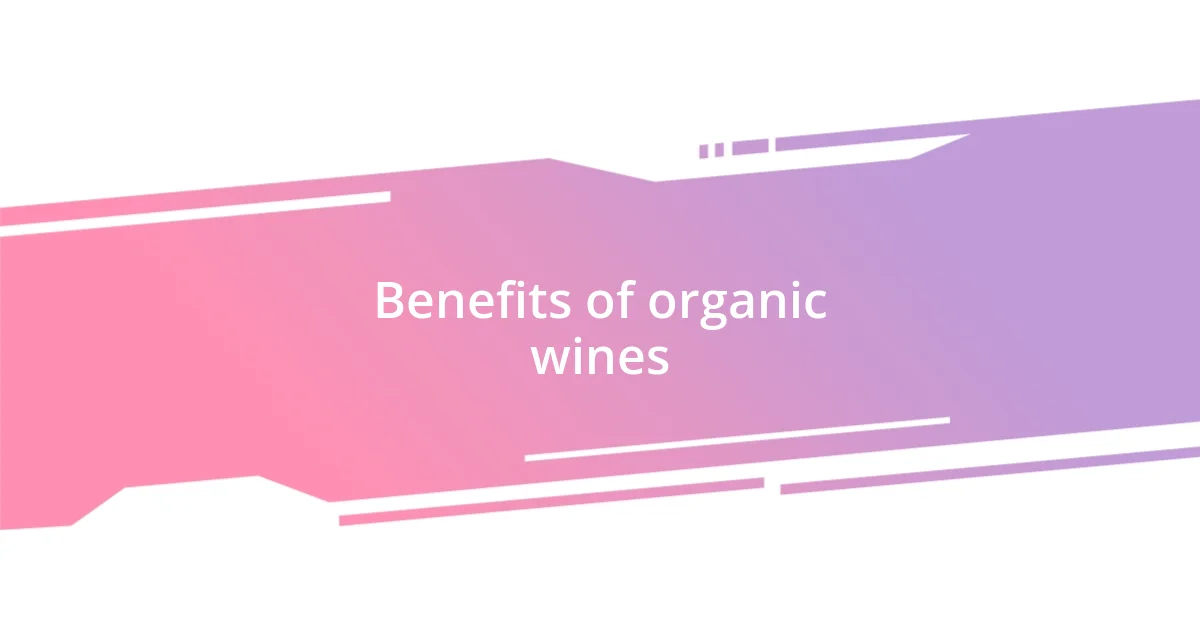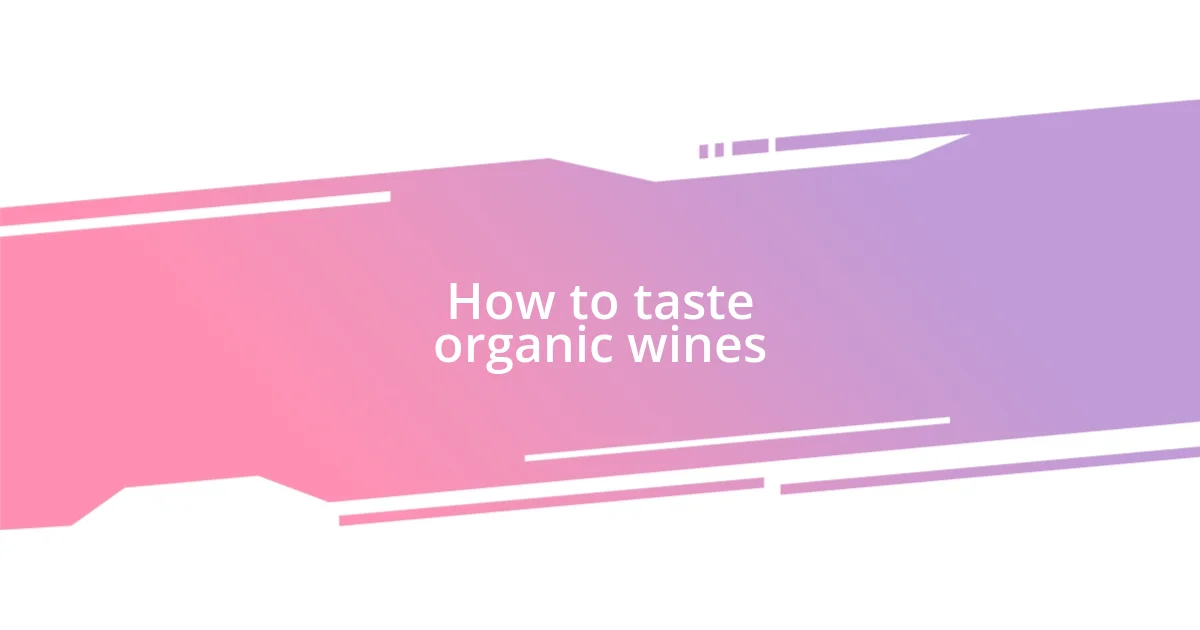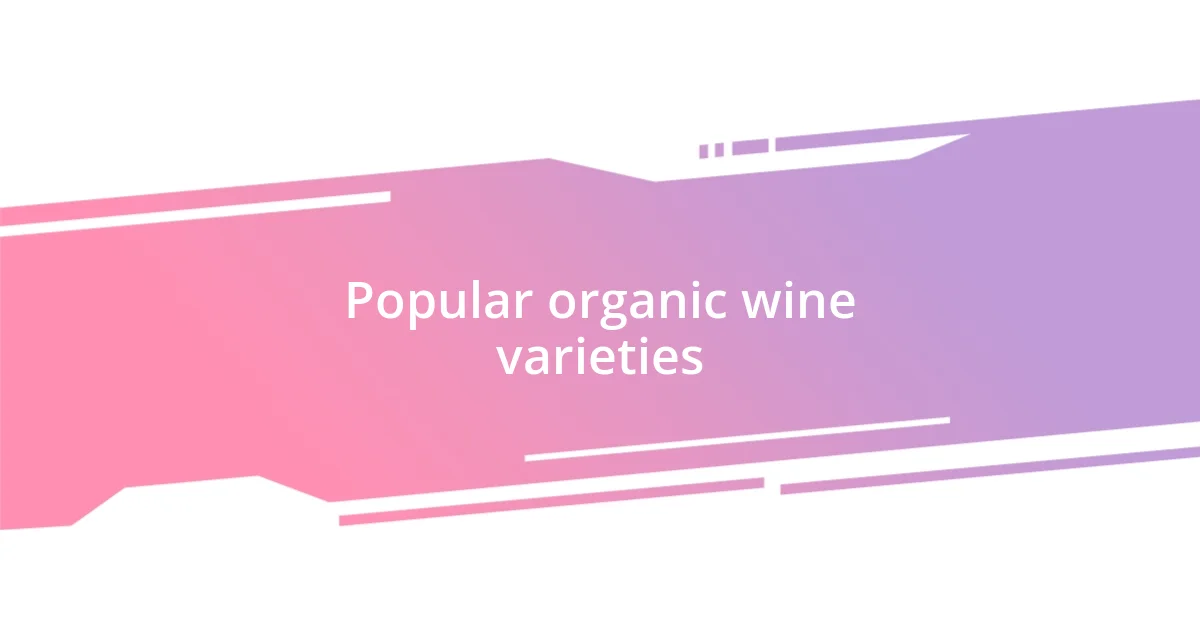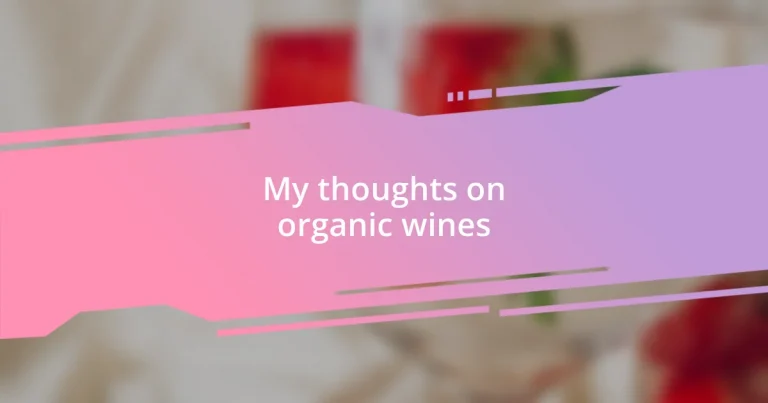Key takeaways:
- Organic wines are produced from grapes grown without synthetic pesticides or fertilizers, enhancing their authenticity and connection to the terroir.
- Key benefits of organic wines include healthier ingredients, enhanced flavor profiles, support for local farmers, and potentially higher antioxidant levels.
- Popular organic wine varieties include Sauvignon Blanc, Pinot Noir, and Syrah, with notable brands being Meinklang, Bonterra Vineyards, and Domaine de la Grand’Cour.

Understanding organic wines
Organic wines are made from grapes that are grown without synthetic pesticides or fertilizers. I remember the first time I tasted an organic wine—it had a distinct freshness that made me wonder about the impact of those untouched grapes. Doesn’t it feel good to think that choosing organic is a way of supporting sustainable farming practices?
Understanding organic wines also means recognizing that these wines often reflect their terroir, that unique combination of geography and climate. For instance, I once enjoyed a bottle from a vineyard nestled in a small valley, and every sip seemed to tell the story of that place. Have you ever experienced a wine that transported you somewhere else, all due to its organic roots?
Notably, organic wine production also typically involves minimal intervention in the winemaking process. This approach often results in a more authentic taste, allowing the natural characteristics of the grapes to shine through. I find it invigorating to explore how less can be more, especially in a world that often values excess. Isn’t it fascinating how this philosophy can transform something as simple as a glass of wine into a celebration of nature’s bounty?

Benefits of organic wines
When it comes to the benefits of organic wines, one of the most appealing aspects is their contribution to environmental sustainability. I vividly recall visiting a vineyard that practiced organic farming. The lushness of the land was evident, and I could see the diverse ecosystem thriving around the grapevines. This experience made me appreciate how organic methods promote healthier soil and biodiversity, which is not only beneficial for wine production but also for our planet.
Here are some key benefits of organic wines:
- Healthier Ingredients: Organic wines contain fewer chemicals, which means a cleaner drinking experience. This leads to a wine that’s potentially kinder on the system.
- Enhanced Flavor Profiles: With organic grapes being cultivated without synthetic aids, the wines often offer purer, bolder flavors. I remember savoring an organic red that had a vibrancy I hadn’t encountered before.
- Support for Local Farmers: Choosing organic often means supporting small, family-run farms. I love knowing that my purchase contributes to livelihoods and practices that respect the earth.
- Higher Antioxidants: Some studies suggest that organic wines may have higher levels of antioxidants, which are beneficial for health. It makes each glass feel like a healthy indulgence!

How to taste organic wines
When tasting organic wines, it’s essential to approach each glass with intention. I always recommend starting with a good look—observe the color and clarity. I once held a deep, garnet-red organic wine up to the light and felt a sense of excitement. It was this visual invitation that enhanced my anticipation of what was to come.
Next, take a moment to inhale the aromas. Swirling the wine in the glass releases a bouquet of scents, and organic wines often surprise me with their complexity. Remember that unforgettable organic Chenin Blanc I had? The scent of ripe pear and fresh-cut grass took me back to a sun-soaked afternoon in the vineyard. Engaging your senses in this way can transform the tasting experience into a vivid journey, rather than just a simple sip.
Finally, the taste is where the magic really happens. Take a small sip and let the wine coat your palate. I’ve noticed that organic wines tend to have a unique balance of acidity and flavor intensity. It’s almost like they carry a whisper of their origin. With each sip of a well-crafted organic Cabernet Sauvignon, I can feel those beautiful sun-drenched grapes reflecting their terroir, and that connection is simply mesmerizing.
| Step | Details |
|---|---|
| Visual Inspection | Look at the color and clarity of the wine. |
| Aroma Evaluation | Swirl the wine and inhale its complex scents. |
| Taste Experience | Take a sip, allowing the wine to coat your palate. |

Popular organic wine varieties
Organic wines come in a variety of types, and each has its own charm. For instance, I still vividly remember a delightful organic Sauvignon Blanc I enjoyed at a small bistro one summer evening. The crisp acidity combined with bright citrus notes delivered a refreshing experience that felt almost like sipping sunshine. Isn’t it fascinating how a single glass of wine can transport you back to a specific moment?
When we dive deeper into red varieties, organic Pinot Noir stands out for its elegance and complexity. A friend once poured me a glass from a well-respected organic vineyard, and I was blown away by the nuanced flavors of cherry, earth, and subtle spice. It was a reminder of how organic practices can influence the wine, allowing the true essence of the grape to shine through. Have you ever experienced a wine that feels like it’s telling a story?
Another popular choice is organic Syrah, known for its bold, rich flavors. I recall visiting a vineyard during harvest season, where I got to taste a fresh, earthy organic Syrah straight from the barrel. The robust flavors of dark fruit and hints of pepper made a lasting impression on me. It’s moments like these that reaffirm my love for organic wines and their incredible ability to showcase the land they come from. What’s your favorite organic wine variety, and how does it make you feel?

My favorite organic wine brands
When it comes to my favorite organic wine brands, one that consistently impresses me is Meinklang from Austria. Their biodynamic practices shine through every bottle, particularly their organic Pinot Noir. I remember savoring it at a cozy dinner party, the wine’s vibrancy and depth sparked conversations about the land and the people behind it. Isn’t it amazing how a single wine can evoke such rich storytelling?
Another standout for me is Bonterra Vineyards from California. I first discovered their organic Cabernet Sauvignon at a local wine shop, and I was taken aback by its lush, velvety texture. Some sips later, I found myself reminiscing about serene afternoons spent among rolling vineyards. How often do you find a wine that feels like it wraps you in a warm blanket of nostalgia?
Lastly, I can’t forget about the organic wines from Domaine de la Grand’Cour in the Rhône Valley. Their Côtes du Rhône blend has a rustic charm that always puts me in a good mood. The first time I tasted it, I was sitting on a patio overlooking a sunset, and the wine complemented the moment perfectly. What’s better than enjoying a great organic wine that enhances not just your palate but the entire atmosphere around you?














